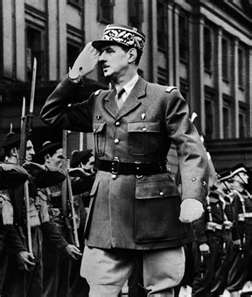 With France supposedly secure behind its Maginot Line, most French people believed there was cause for optimism. Having the largest army in Europe, they reasoned that their country would surely prevail. This view was not shared by a certain French colonel, named Charles de Gaulle. On 26 January 1940, he issued a memorandum advocating that France establish a corps de reserve mecanique, namely a mobile [armoured] reserve, before it was too late. The idea was not new. The Soviet general, Mikhail Tukhachevsky, had advocated large scale motorized units in the 1930s—and been executed when his philosophy fell into disfavour.
With France supposedly secure behind its Maginot Line, most French people believed there was cause for optimism. Having the largest army in Europe, they reasoned that their country would surely prevail. This view was not shared by a certain French colonel, named Charles de Gaulle. On 26 January 1940, he issued a memorandum advocating that France establish a corps de reserve mecanique, namely a mobile [armoured] reserve, before it was too late. The idea was not new. The Soviet general, Mikhail Tukhachevsky, had advocated large scale motorized units in the 1930s—and been executed when his philosophy fell into disfavour.
Most famously, the German general, Heinz Guderian, advocated exactly this kind of mobile armoured warfare and coupled it with airpower. He is considered by many to be father of the so-called Blitzkrieg, the tactics that the German army had used so successfully against Poland in 1939 and were to use against the Low Countries and France in May and June, 1940. Guderian explained much of this in his book ‘Achtung–Panzer!‘ (1937). As with many ‘new’ ideas, Blitzkrieg has roots that stretch back to earlier times. Both the British and the Germans attempted to apply such tactics during World War I, but the necessary technology—sufficiently modern vehicles and sufficiently modern planes—was absent. One might also mention the contraversial British strategist, Sir Basil Liddell Hart. Many of the post-war generation credited Liddell Hart with the basic ideas of Blitzkrieg and he was even acknowledged by Guderian in the English edition of that German general’s memoirs. But perceptions change with time, and likewise the allocation of credit. Recent historians have recognized that the truth is more complicated.
Whatever the origins of Blitzkrieg, it is a fact that de Gaulle alerted his country to the danger in his memorandum of 26 January 1940. France had the tanks (better ones than Germany) and the warplanes (more of them than Germany). If de Gaulle’s warning had been heeded, and the French had created large-scale mobile armoured units—the equivalent of the German panzer divisions—with air support, perhaps France would not have fallen in June 1940.
